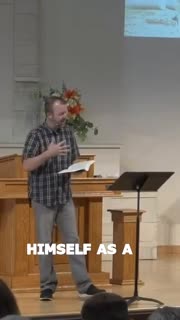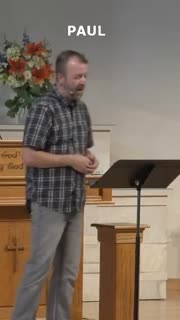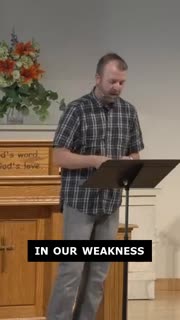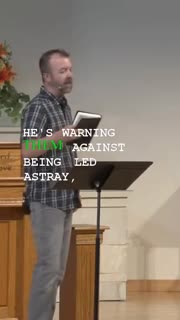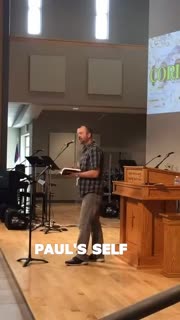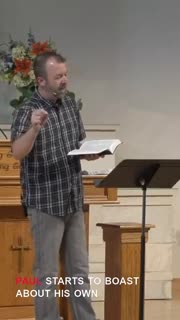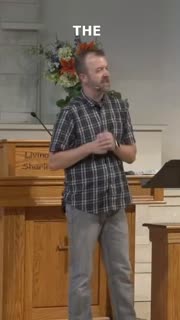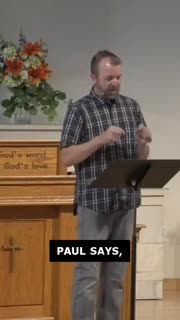Strength in Weakness: Paul's Call to Authentic Faith
Devotional
Sermon Summary
Bible Study Guide
Sermon Clips
### Quotes for outreach
1. "Paul describes himself as a protective spiritual father trying to save the Corinthians from the deception that's all around them. And if you remember, the Corinthians have all of these forces pulling at them from the community around them, the pagan influence of the area. So Paul is trying to save them from that and from the false apostles that are in the area teaching and preaching a false gospel about a false Jesus." [29:08] (30 seconds)
2. "Paul exposes these false apostles as being truly deceitful workers, masquerading or pretending to be apostles of Christ. They're not true apostles of Christ, they're pretending to be. Just like Satan disguises himself as an angel of the light, Paul says these imposters are presenting themselves as servants of righteousness. But he says their end will be according to their deeds." [36:32] (28 seconds)
3. "Paul recounts the many trials that he's faced. How many of us can say that we've faced that many trials living out our faith in Jesus? I would guess none of us have been through what Paul just wrote about. Imprisonments, beatings, shipwrecks, numerous imprisonments, beatings, and shipwrecks. Dangers from everywhere, it seemed like. And even this harrowing escape from Damascus, where he was literally almost killed. But he gets lowered down in a basket." [41:40] (40 seconds)
4. "In our weakness and struggles, Christ's power is made perfect. So what do we do with all of that? How do we apply? All of those lessons. So first, we need to embrace our weaknesses. Like Paul, we have to learn to boast in them. That means being honest about our struggles. That means being honest about our failures and trusting that God's grace is sufficient for us. Even in our weaknesses, God's grace is sufficient." [50:57] (38 seconds)
5. "We need to find strength in suffering. Find strength in suffering. We have to reframe our understanding of our trials, of our hardships. Rather than seeing them as a curse, we can view them as an opportunity for growth and deeper intimacy with Christ. And it's hard to do. It's hard to do unless we're close to Christ. Unless we know what He says. When we face trials, we have to remember Paul's example and find strength in knowing that our sufferings unite us with Jesus, who, by the way, suffered for us, who died for us." [52:36] (46 seconds)
### Quotes for members
1. "Paul is warning them against being led astray, warning the Corinthians, about being led astray by false teachers, these, who are preaching a different Jesus, a different spirit, and a different gospel. And he uses the analogy of a protective father and a betrothed bride, and he's emphasizing his desire to present the church as being holy and pure to Christ." [31:57] (26 seconds)
2. "Paul's self-sacrifice and dedication to the truth is in stark contrast. It's vastly opposite. To the deceit and the self-serving motives of the false apostles or the super apostles, as Paul puts it. Continuing on verse 13, for such men are false apostles, deceitful workmen, disguising themselves as apostles of Christ. And no matter, and no wonder for even Satan disguises himself as an angel of the light." [34:53] (32 seconds)
3. "Paul starts to boast about his own weakness and his own sufferings. And his reason for doing that, he says, is because he's is really not to brag about himself, but to contrast his actions with those of the false teachers. He's contrasting, this is me, this is what I've dealt with. This is in contrast to what these false teachers who have made slaves of you, who have done this to you, who have done this, and this, and this to you. But this is what I've done for you, for the sake of you." [41:40] (40 seconds)
4. "Paul's warnings against the false teachers and false apostles, it emphasizes that need. As the church, he was of course writing to them and how they need to discern what is being taught. There's a false, not right Jesus, not right spirit, improper gospel. You guys need to discern that, Paul is telling them. Well, for us, it's not a whole lot different. Think about the world that we're in, how badly we need discernment in our world." [45:15] (35 seconds)
5. "Paul says, those trials that I've been through authenticate my faith in Christ. They authenticate it. And for us, that means recognizing that suffering is not a sign of God's abandonment, but it's a testament to our faithfulness. Now, when I was spending the better part of the last year as a chaplain at Mayo, I can't tell you how many times, how many times I heard people say, God must have abandoned me because I got cancer again. God must have abandoned me because my child died. God must have abandoned me because my loved one was in this accident. I'm going through a trial. I'm going through a hardship, so God must not be here. But Paul says, nothing could be further from the truth." [49:00] (63 seconds)
Ask a question about this sermon
1. "Paul describes himself as a protective spiritual father trying to save the Corinthians from the deception that's all around them. And if you remember, the Corinthians have all of these forces pulling at them from the community around them, the pagan influence of the area. So Paul is trying to save them from that and from the false apostles that are in the area teaching and preaching a false gospel about a false Jesus." [29:08] (30 seconds)
2. "Paul exposes these false apostles as being truly deceitful workers, masquerading or pretending to be apostles of Christ. They're not true apostles of Christ, they're pretending to be. Just like Satan disguises himself as an angel of the light, Paul says these imposters are presenting themselves as servants of righteousness. But he says their end will be according to their deeds." [36:32] (28 seconds)
3. "Paul recounts the many trials that he's faced. How many of us can say that we've faced that many trials living out our faith in Jesus? I would guess none of us have been through what Paul just wrote about. Imprisonments, beatings, shipwrecks, numerous imprisonments, beatings, and shipwrecks. Dangers from everywhere, it seemed like. And even this harrowing escape from Damascus, where he was literally almost killed. But he gets lowered down in a basket." [41:40] (40 seconds)
4. "In our weakness and struggles, Christ's power is made perfect. So what do we do with all of that? How do we apply? All of those lessons. So first, we need to embrace our weaknesses. Like Paul, we have to learn to boast in them. That means being honest about our struggles. That means being honest about our failures and trusting that God's grace is sufficient for us. Even in our weaknesses, God's grace is sufficient." [50:57] (38 seconds)
5. "We need to find strength in suffering. Find strength in suffering. We have to reframe our understanding of our trials, of our hardships. Rather than seeing them as a curse, we can view them as an opportunity for growth and deeper intimacy with Christ. And it's hard to do. It's hard to do unless we're close to Christ. Unless we know what He says. When we face trials, we have to remember Paul's example and find strength in knowing that our sufferings unite us with Jesus, who, by the way, suffered for us, who died for us." [52:36] (46 seconds)
### Quotes for members
1. "Paul is warning them against being led astray, warning the Corinthians, about being led astray by false teachers, these, who are preaching a different Jesus, a different spirit, and a different gospel. And he uses the analogy of a protective father and a betrothed bride, and he's emphasizing his desire to present the church as being holy and pure to Christ." [31:57] (26 seconds)
2. "Paul's self-sacrifice and dedication to the truth is in stark contrast. It's vastly opposite. To the deceit and the self-serving motives of the false apostles or the super apostles, as Paul puts it. Continuing on verse 13, for such men are false apostles, deceitful workmen, disguising themselves as apostles of Christ. And no matter, and no wonder for even Satan disguises himself as an angel of the light." [34:53] (32 seconds)
3. "Paul starts to boast about his own weakness and his own sufferings. And his reason for doing that, he says, is because he's is really not to brag about himself, but to contrast his actions with those of the false teachers. He's contrasting, this is me, this is what I've dealt with. This is in contrast to what these false teachers who have made slaves of you, who have done this to you, who have done this, and this, and this to you. But this is what I've done for you, for the sake of you." [41:40] (40 seconds)
4. "Paul's warnings against the false teachers and false apostles, it emphasizes that need. As the church, he was of course writing to them and how they need to discern what is being taught. There's a false, not right Jesus, not right spirit, improper gospel. You guys need to discern that, Paul is telling them. Well, for us, it's not a whole lot different. Think about the world that we're in, how badly we need discernment in our world." [45:15] (35 seconds)
5. "Paul says, those trials that I've been through authenticate my faith in Christ. They authenticate it. And for us, that means recognizing that suffering is not a sign of God's abandonment, but it's a testament to our faithfulness. Now, when I was spending the better part of the last year as a chaplain at Mayo, I can't tell you how many times, how many times I heard people say, God must have abandoned me because I got cancer again. God must have abandoned me because my child died. God must have abandoned me because my loved one was in this accident. I'm going through a trial. I'm going through a hardship, so God must not be here. But Paul says, nothing could be further from the truth." [49:00] (63 seconds)
